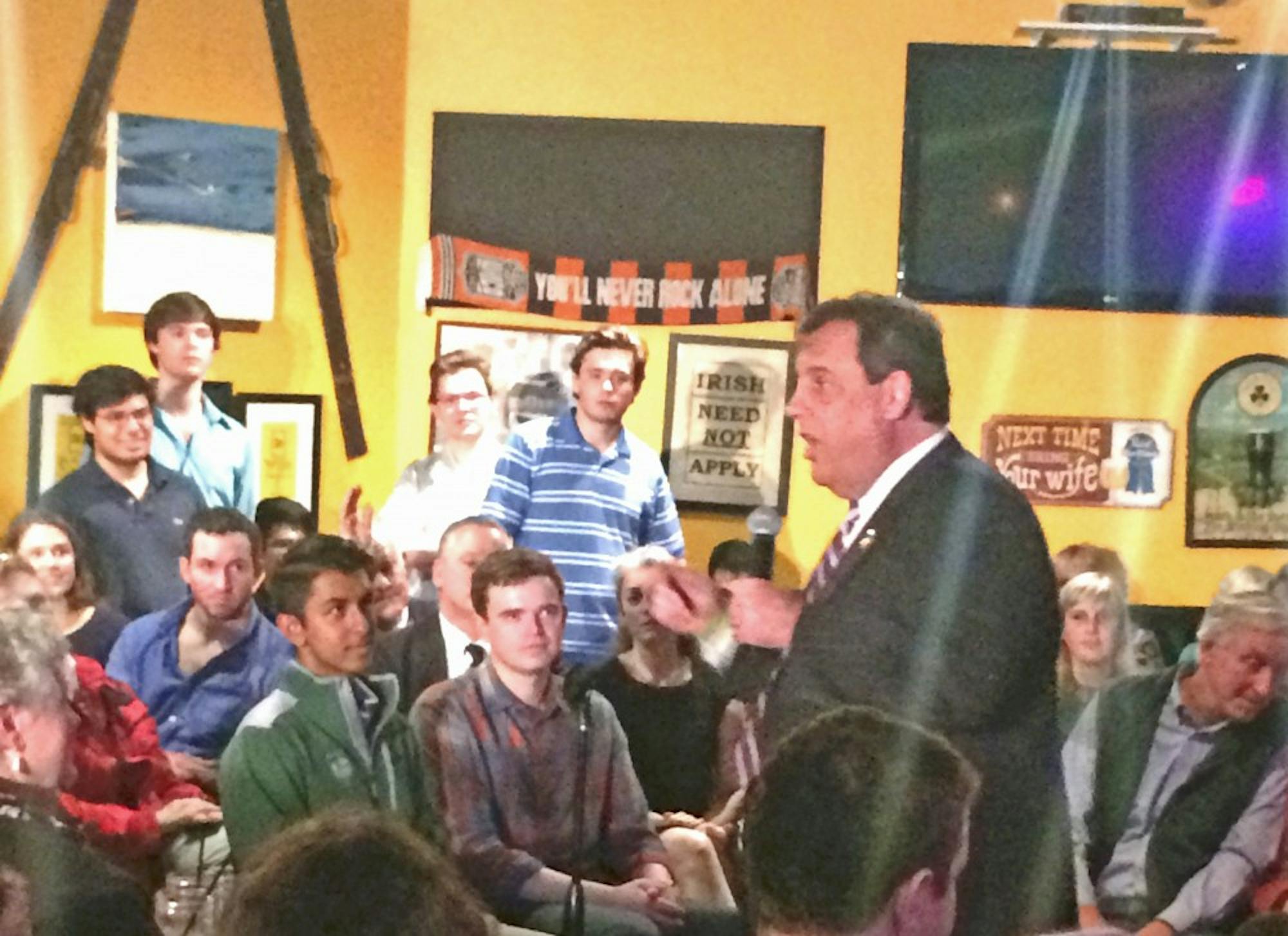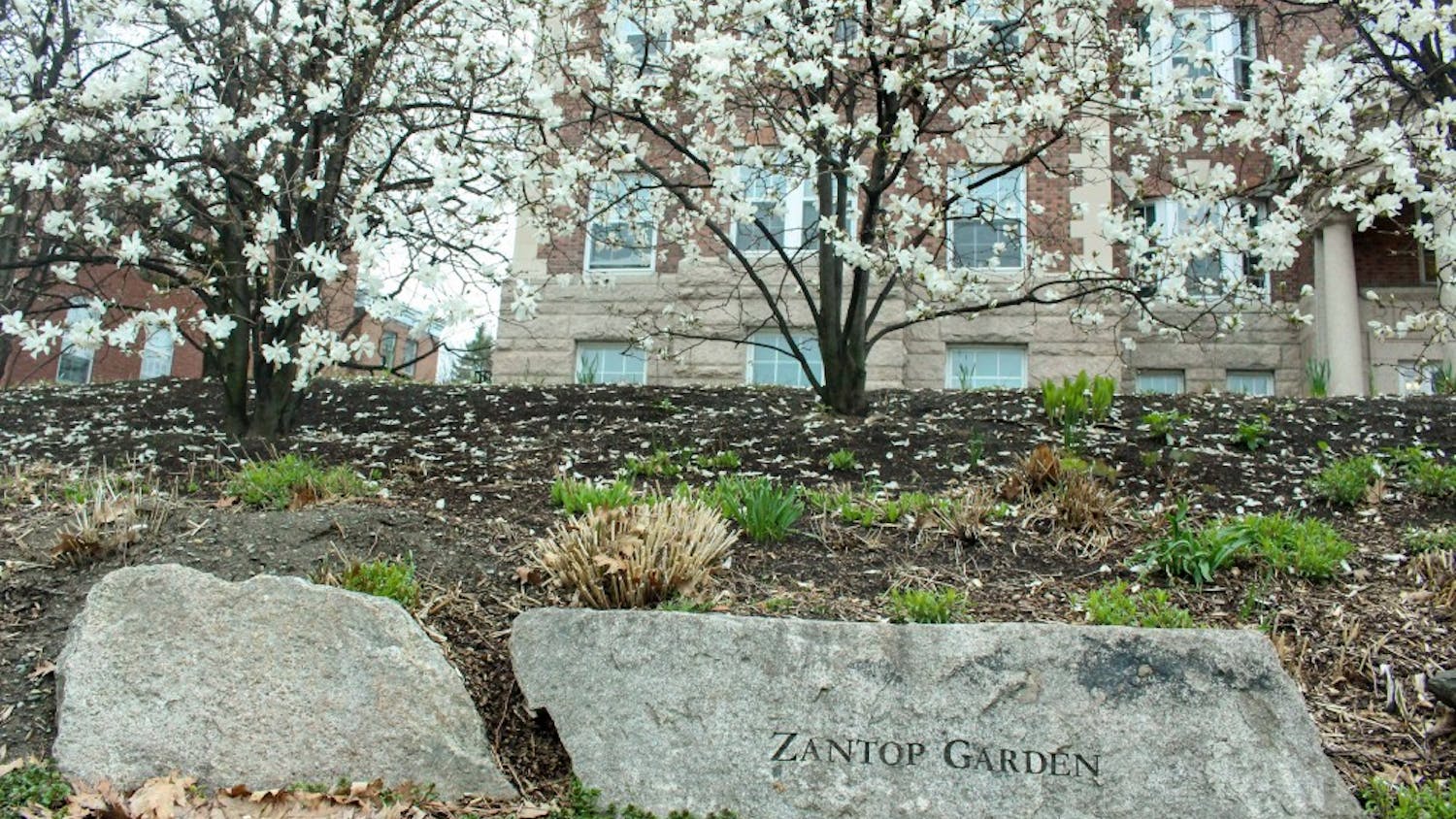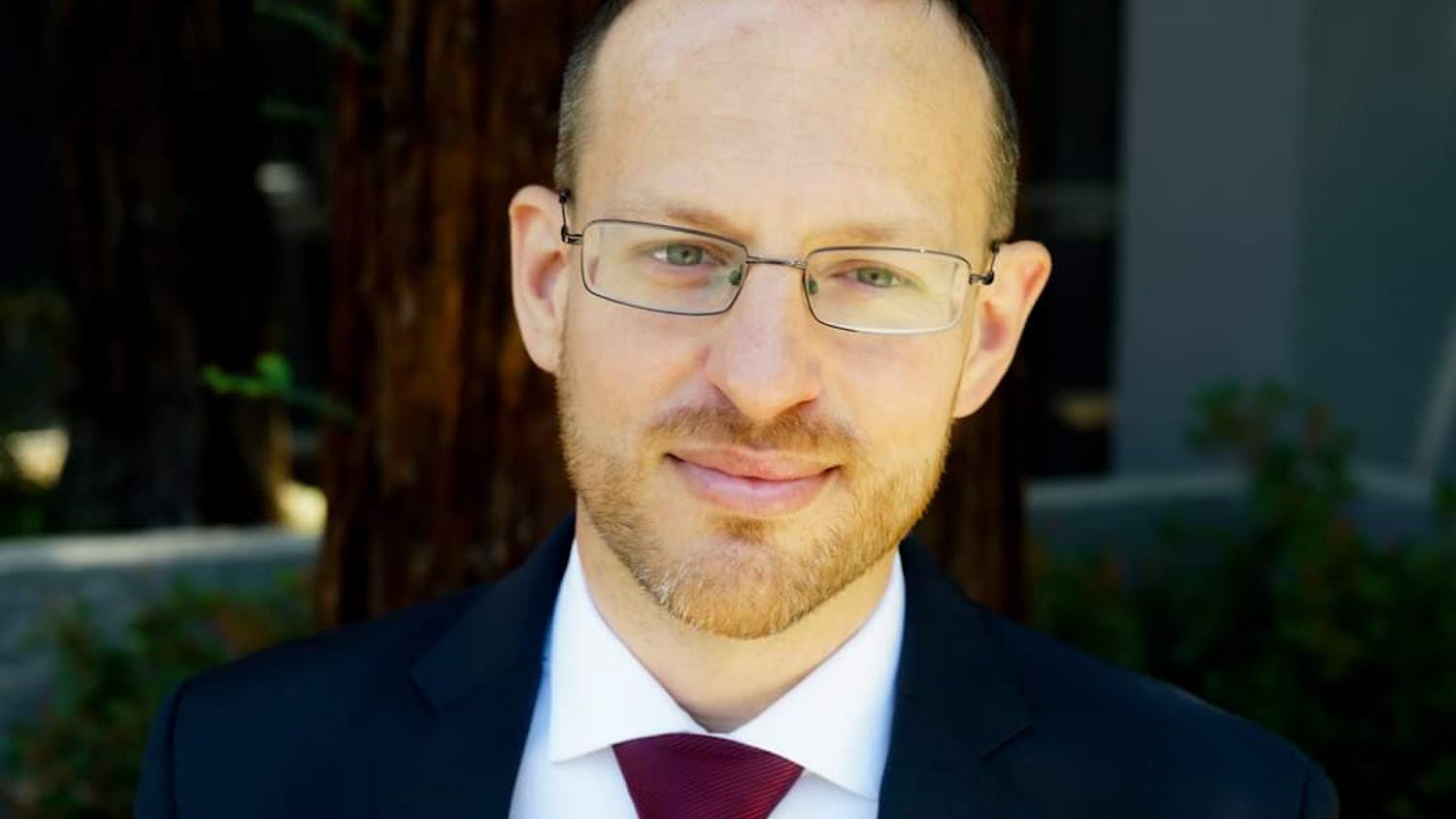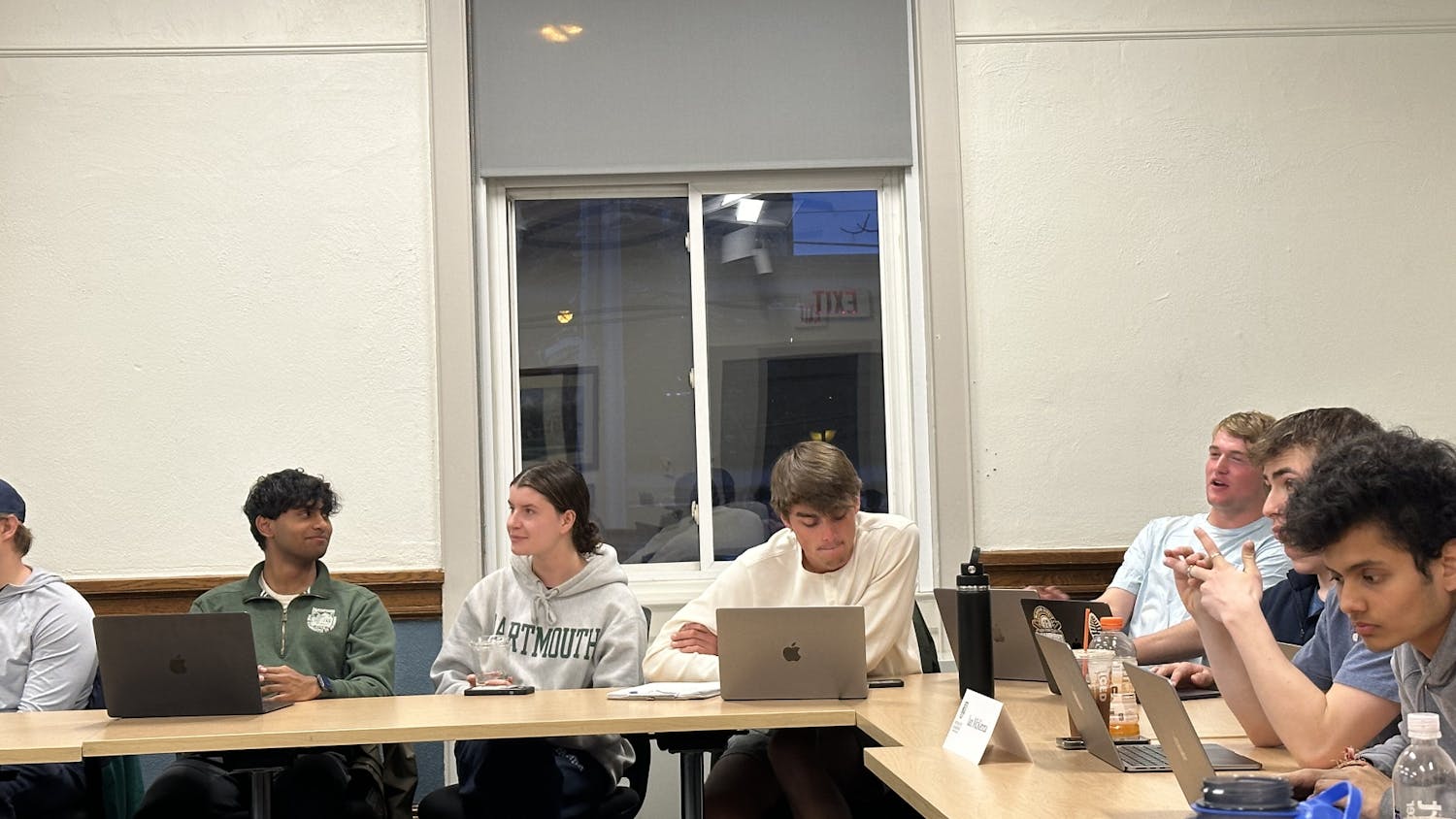While some presidential candidates who have swung by the Upper Valley speak to large halls, Gov. Chris Christie (R-N.J.) talked in the packed Salt Hill Pub Friday afternoon as staff served food and drinks around him and some patrons of the bar continued to watch a game on television.
“There have been lots of things said about me over time,” Christie said. “The fact that I don’t make an impression was never one of them.”
At least a couple of hundred people jammed inside Salt Hill for the Republican presidential candidate’s remarks and a town hall-style meeting.
Christie fielded questions from students and community members on the economy, national deficit, entitlement spending, finance industry regulation, renewable energy and other topics, but focused his own remarks on addiction and how it can be treated.
“I think he’s very candid, whether you agree with him or not,” Andrew Wolff ’18 said.
Wolff — who has not decided if he will support Christie or Gov. John Kasich (R-Ohio) — said Christie’s work with teachers’ unions in New Jersey was a major achievement.
“I like him, I think, a lot more than other people do,” Wolff said. “I’m a little disappointed that he’s not polling better.”
Christie began the event by discussing his experiences at Daytop Village — a rehabilitation center in Mendham, New Jersey — where he was a board member. Christie told the story of a 17-year-old boy who was given an ultimatum by a judge — treatment at Daytop Village or state prison.
“Drug and alcohol addiction is a disease, not a moral failing, and we have to give people the tools they need to treat their disease and bring value back to their lives,” Christie said.
The boy graduated from Daytop’s high school program, then Rutgers University and encountered Christie again while a law student, at which point Christie — then a United States Attorney — offered him a summer internship. Later, the boy started his own law firm in New York, focusing on criminal defense work.
“This was a young man who was near death, whose parents had no hope. He was ready to go to state prison rather than be treated,” Christie said. “When I looked in his eyes, there was no life in his eyes — heroin had drained the life from him. Because he went and got treatment and took it seriously, and there were people who cared about him and loved him, he reclaimed his life.”
Christie said he is “pro-life for the whole life,” rather than just for unborn children.
“We’ve got to be pro-life for the 16-year-old girl on the floor of the county lock-up,” he said.
Christie fielded numerous questions on foreign affairs. Several audience members asked about his stance on combating the Islamic State, also known as ISIS, and Chinese incursions into the South China Sea.
Christie advocated aggressive diplomacy, utilizing positioning of naval forces around the South China Sea to deter China from erecting artificial islands to hinder foreign trade and instituting an absolute no-fly zone over Syria that would apply to forces of the Russian Federation, Syrian forces of all factions and any other aircraft.
“Don’t do a preemptive attack, it’s wrong,” Christie said. “Warn them: ‘I don’t want conflict, but if you bring it, I’ll respond.’ That’s how you bring order back to the world, not by being the world’s policeman, but by saying, ‘Here are the parameters of acceptable and unacceptable conduct with the United States,’” he said.
An audience member asked Christie if he believed that American imperialism had led to the rise of the Islamic State. American imperialism — which Christie dismissed as a “good college phrase” — was not a key component of the Islamic State’s rise, which he suggested was instead prompted by Islamic militancy.
“I think what the rise of ISIS is tied to is radical Islam and the desire of ISIS to impose upon everyone in the world not only their religion but their interpretation of their religion, which I believe is perverse and violent,” he said.
Christie criticized the foreign policy of President Barack Obama and Secretary of State John Kerry. Their policies — particularly in relation to Russia, Cuba and Canadian tar sands oil — were poorly conducted and sometimes harmed American interests, Christie said.
The United States was lucky to avoid a Kerry presidency in 2004, Christie quipped.
“This president thinks that inaction is always the preferable course regarding foreign policy, and I think it isn’t and it shouldn’t be,” he said.
Christie — who, along with former Gov. George Pataki (R-N.Y.), is one of two Republican presidential candidate to accept that climate change is anthropogenic — spoke about the need for increased investment in renewable energy resources on a national scale.
Greater reliance on nuclear energy — which provides 53 percent of New Jersey’s energy supply — is key to a successful energy policy, Christie said. Drilling for more natural gas and oil is also important, as is localized, state-by-state renewable energy development, he said.
Christie called for reductions in entitlement spending to allow for funding for other projects, including NASA.
“There’s gonna be no free lunch in a Christie administration,” he said. “I’m coming in with $19 trillion in debt and a credit card that’s already more than maxed out, and we can’t keep putting money on it.”
Matt Zubrow ’14 asked Christie about the Volcker Rule — a measure that bans banks trading on their own assets utilizing proprietary information — and its potential impact on financial issues, while Wolff asked about the regulatory impacts of the Dodd-Frank Wall Street Reform and Consumer Protection Act of 2010.
Christie said he favored market solutions in both instances, but praised the regulatory framework of Dodd-Frank for large, national banks. He said it should not apply to smaller banks.
Christie said, however, that he would like to see bankers responsible for the 2008 financial crash prosecuted and that under the current financial system it is “hard to argue” the American economy is not rigged to favor the wealthy.
Christie advocated for increased cooperation between Congress and the executive branch to reduce gridlock and promised to work closely with the House Democratic leader and other opposition members of Congress if elected.
Additionally, reforms to “slow down the revolving door” between government and lobbyists must be put in place, he said. Christie also endorsed term limits for all members of Congress — six terms the maximum for the House and two for the Senate.
Although he supports allowing individuals and organizations to give as much money as they would like to any candidate, Christie said he wants all donations to be publicly disclosed within a 24-hour period.
“I should be responsible for every nickel that’s spent on my behalf,” he said.
Christie was introduced by Republican Party of New Hampshire Area 1 vice chair Vicki Schwaegler. Christie previously spoke in Hanover in 2011 to endorse former Gov. Mitt Romney (R-Mass.) for president, she said.
Christie also received encouragement from the audience during the question and answer session. One community member noted he “had no idea there were this many Republicans in Hanover,” referencing the hundreds of people who turned out to hear Christie speak. Another encouraged Christie to keep working to win the nomination despite his current low polling numbers.
“I know you’re a fighter, and it’s so discouraging to watch that last what-they-called-a-debate and watch the media twist things,” the community member said.
Saaheb Sidana ’16 said that he enjoyed Christie’s talk on addiction.
“I don’t really know much about him or his political views, but I thought he was a very charismatic and a very strong speaker,” Sidana said.
Sidana will probably not support Christie but hopes to attend talks by several candidates before making up his mind.
“Because they’re happening and they’re not too far away, it’s very convenient for a college student to go down the street and hear a presidential candidate speak,” he said.
A recent WBUR poll conducted between Oct. 29 and Nov. 1 put Christie support at 7 percent in New Hampshire, behind Donald Trump, Ben Carson, Sen. Marco Rubio (R-Fla.) and Kasich, tied with former Gov. Jeb Bush (R-Fla.). Previously in this campaign, he has been polling between 3 and 6 percent.




